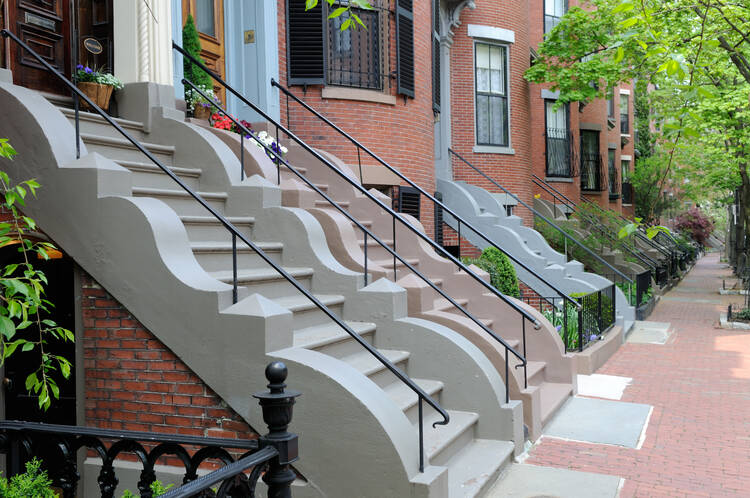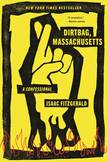‘Dirtbag, Massachusetts’: a former Catholic’s memoir about growing up in a turbulent home—and a broken church
Isaac Fitzgerald’s collection of essays Dirtbag, Massachusetts: A Confessional isn’t a Catholic memoir. Except when it is.
Fitzgerald, who is also a children’s book author, begins at the start of his turbulent childhood: “My parents were married when they had me, just to different people.” From there, things get ever rockier. His father leaves his mother and him behind for stretches at a time. Fitzgerald acts out with drugs and alcohol. There’s a fair bit of violence. And lots of instability.
But Fitzgerald’s childhood had one constant: It was saturated with Catholicism. His parents, young and unable to get their footing financially, had moved during his youth into Catholic Worker houses in Boston, including one situated in the city’s South End, on Massachusetts Avenue. “It was called Mass Ave for short, and as a child, I used to think that our street was named after a church service, not the state we lived in,” Fitzgerald writes in his opening essay, “Family Stories.”
Fitzgerald’s mother secured work at Boston’s Cathedral of the Holy Cross, tidying up and completing secretarial tasks while getting to know the clergy who frequented the complex, including the notorious protector of abusive priests, Cardinal Bernard Law. Fitzgerald regularly spent time exploring the church and the residence while his mother completed her work. The soaring ceiling and stained-glass windows made an impression on the child.
“It would feel massive to anyone at any age, but when you’re six and enveloped by the shadow of the enormous organ as you follow its countless pipes reaching up and up and up to a ceiling so far away it might as well be the sky, it was so deeply lonely and self-abnegating that it was almost transcendental,” he writes.
But that space would eventually represent something else to Fitzgerald.
One afternoon, he and his older half-brother were playing at the cathedral when a friendly priest whom the boys did not recognize joined in, cajoling them into an attic as part of a pretend mystery that needed solving. The priest gave Fitzgerald and his brother candy. They laughed at his jokes. Here was a fun priest, Fitzgerald thought.
Another priest, who seemed much less fun, discovered the priest and the boys in the attic. He became angry and yelled at the boys. Fitzgerald had always felt welcome at the cathedral, he writes, “But something changed after that day in the attic.”
“My mother was told that I couldn’t come to work with her anymore,” he recounts. “I could of course come to church for mass on Sunday and the like, and it was okay for me to be there with my ma for a minute if she was just swinging by, but that put an end to my hours wandering around the grounds alone.”
It was only in retrospect that Fitzgerald discerned that there was perhaps something more going on in that attic. “That indignant priest, while perhaps acting like a prick, was not being a prick,” Fitzgerald writes. “By forbidding me to hang out in the rectory—hell, the whole entire church during off-hours—the angry priest was trying to make sure I didn’t become a victim myself.”
Later, Fitzgerald would find out that a priest for whom he had served as an altar boy in the 1990s had been accused of abusing children in the 1970s. When The Boston Globe broke the story about abuse in Boston, Fitzgerald’s mother seemed for years unable to speak about it. His father, a Catholic school principal who had been in recovery, began drinking again for a short time.
Eventually, through an intense conversation with his mother, in which much was left unsaid, Fitzgerald was nonetheless able to allay her worries that her work had put him in jeopardy. He was never physically abused, though he recounts a creepy episode with a prurient priest during confession. While his parents stayed active in their faith, Fitzgerald stopped going to church once he began boarding school, taking advantage of the freedom that came with having no adults around to tell him he had to go to Mass.
“I don’t regret it, though occasionally there are things I miss about church,” he writes of his decision to leave behind his childhood faith. “The high, exalted feeling of my soul full to the brim after Sunday Mass (though I only truly felt this when I was a kid and suspect that even if I were a practicing Catholic now this joy would be lost to me). The fun of getting together with a large group of people and belting out songs. Like some sort of religious group karaoke. A very pious kind of karaoke, sure, but karaoke nonetheless. Plus, there’s wine.”
But something from his faith stuck with Fitzgerald. And he’s not alone.
A study from 2015 found that about 15 percent of Americans identify as “former Catholics.” Taken as a group, that would make lapsed Catholics one of the largest religious groups in the country. But it is a group we know too little about. There are many memoirs written by individuals who have left the church but who remain filled with enough anger to fill an entire book. Fitzgerald’s stories are different. They are an invitation to consider thoughtfully the inner life of someone who was shaped by Catholicism but who no longer practices his faith.
Though Dirtbag, Massachusetts is confessional, it is not pious. Fitzgerald’s discussions of religion are interspersed with page-turning stories chronicling teenage drinking, his experience working in the pornography industry and his adventures smuggling supplies to persecuted groups in Burma.
Isaac Fitzgerald: "There is always a place to talk to God, even if it’s a God you don’t believe in.”
Fitzgerald has experienced enough distance and time away from the church that he can reflect in a fairly positive light on the faith his parents tried, seemingly unsuccessfully, to pass down to him. And his writing about what his faith means to him is as nuanced and thoughtful as the prose penned by some practicing Catholics trying to bring others to the church.
“My time in that space has shaped my entire life,” Fitzgerald writes. “Catholicism wasn’t for me, but it’s in me; it’s around me; it’s a lens I look through sometimes without even consciously realizing it. It’s in and on my skin. In so many ways, I can’t help but carry the Catholic Church and its philosophies with me, always, even though I left the church long ago.”
On a recent Christmas, Fitzgerald attended Mass at a Benedictine church in Massachusetts. He was struck by the simplicity of the chapel, how it spoke to him in ways that rivaled the soaring windows in the cathedral of his youth.
“I’ll never attend church regularly again. I’ll never sit for confession again. But I can’t deny that on Christmas morning, in the right church, with the right people, the sunlight cutting across the crucifixion can be a beautiful thing,” he writes. “Speaking and singing old, old phrases together can be a beautiful thing.”
But it’s on the grounds near the church where Fitzgerald feels connected to something larger than himself.
“Still, the best part of visiting Glastonbury Abbey is walking among the nearby pines,” he writes. “That despite the endless ways in which [Fitzgerald’s parents and he] diverge, we agree on this: There is always a place to talk to God, even if it’s a God you don’t believe in.”










